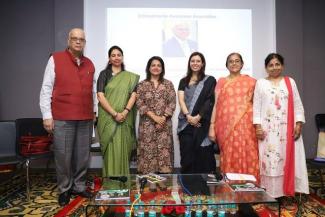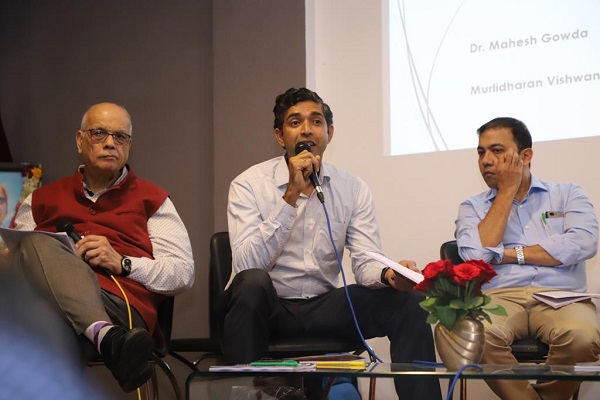
A full day conference organised by Schizophrenia Awareness Association in Pune covered a wide range of issues that impact caregivers of persons with mental illness and provided a platform for fellowship among caregivers and other stakeholders.
The Schizophrenia Awareness Association-SAA, organized a full day, All India Conference of Caregivers of Persons with Mental Illness – CAME,in Pune on Tuesday, the 10th September 2019 in memory of its Canada based founder Dr. Jagannath Wani, a caregiver to his wife who lived with schizophrenia.
In the first session of the conference, there were panel discussion on “Disabilities Laws in India: A Boon or a Bane for Families”. The main discussion was on Mental Healthcare Act 2017 but panelists also covered Rights of Persons with Disabilities Act 2016 and National Trust Act 1999. The presentations followed by discussions highlighted the numerous benefits flowing from these acts, which should be taken advantage of by families and a few features in these Acts, such as advance directives and nominated representatives, which though laudable provisions to promote human rights of persons with mental illness, were not conducive in Indian context and might create practical difficulties for the families and, therefore needed to be reviewed and amended.

The panelists for the session were Dr. Mahesh. R. Gowda, a senior consultant psychiatrist from Bangalore, Dr. Kaustubh Joag, a senior consultant psychiatrist from Pune, Shri Murlidharan Vishwanathan, General Secretary, National Platform for Rights of Disabled-NPRD from Delhi, and Cmd. S.N. Bijur President of PARIVAAR, a Federation of 290 organisations of Persons with Intellectual Disabilities.
The second session was on Challenges of Caregiving for Families with a Family Member with Mental Illness which was of great relevance to the participants. It was an interactive experience sharing session by caregivers and clinical psychologists. Participants learnt from each-others’ experience and got guidance from professionals. All agreed that the suffering of family caregivers was no less than that of family member living with mental illness.
The panelists were all ladies, two caregivers, Ujjwala Dixit a caregiver of her son, Tanya Dutt from Chennai, a caregiver by choice, three clinical psychologists, Hvovi Bhagwagar from Mumbai doing her private practice, Dr. Uma Dalvi, attached to a hospital and Dr. Mansi Rajhans a senior faculty member. The professionals among the panelists emphasised the need for self- care by the family caregivers. While accepting the importance of self-care, the caregivers said that in practice, the pressure of caregiving was so overwhelming that it was difficult to follow this dictum. It was an intense educative session and brought tears in many eyes!
CHALLENGES FOR CAREGIVERS OF PERSONS WITH MENTAL ILLNESS - by Tanya Dutt
This was an interesting session where Mrs Ujjwala Dixit and I shared our experiences as caregivers. Pschologists Ms. Hvovi Bhagwagar, Dr. Uma Dalvi, Dr. Mansi Rajhans spoke of their professional experiencences - the role of caregivers, how their involvement was imperative in mapping of treatment for the service user. Caregivers must not ignore their own mental health needs. The struggle to continue treatment with limited resources.
I spoke about a few key aspects of care giving as a secondary care giver to my uncle, a previous caregiver to my sister in law and caregiver to the individuals at Atmanirbhar and Aasha.
Acceptance: To begin with the family needs to accept that there is an illness in the family and not deny this fact. It took my mother’s family 10 years to finally get my uncle diagnosed with Schizophrenia. My grandmother would start crying the moment someone said that my uncle might have an illness. There was such less awareness about mental illness.
Stigma: There is tremendous amount of stigma in the world around us but the worst sort of stigma is self stigma when we are so stigmatised ‘by what will people think and say’ about us and our loved one.
Medical compliance: I cited the example of an service user who would stop medication everytime he functioned really well at work. This would ultimately lead to a relapse. This pattern of ‘doing well -discontinuing medication-relapse -back on medication- resuming basic work again’ was repeated a couple of times and caused a lot of distress to the individual.
Marriage: I spoke about how complete disclosure was required if marriage was being considered and how some women at Aasha had been abandoned because the woman’s family did not disclose the mental illness at the time of marriage. I mentioned how my uncle was married to a lady who knew about his illness in full and still wanted to get married to him but the marriage ended within a few months because she couldn’t cope with it.
Employment: When it comes to employment for people with mental illness the most significant aspect is expectations. We have to keep expectations small in the beginning. Education must not take precedence over what is available. Engagement is important. They might have trained to be an engineer however if the only job they are getting is in a grocery store then they must start there, find structure, regain self esteem and move on to employment of their choice.
The Future: Every caregivers’ deepest fear is ‘what after me’. There is the option of ‘Trusts’ one could start to provide for monetary care for their loved, there were some facilities where individuals could stay long term. However I think we as caregivers need to form communities and circles of friends and extended relatives who could monitor the well being of the service user. If they were lucky to have siblings then they had to be compulsorily involved in the care of the individual.
The third session was on “Organisations of Caregivers of Persons with Mental Illness: Failures and Remedies”. In the last two decades several attempts made by family leaders had failed in forming and running a federation of organisations of families of persons with mental illness. On the other hand, organisations of families of persons with physical disabilities and intellectual disability had strong organisations which were doing effective advocacy and were getting attention from the government agencies. Even Indian Psychiatrist Society was functioning as an effective professional body of Indian psychiatrists. Organisations representing families of persons with mental illness, however, remained fragmented and offered no united front. This was discussed and analysed and various alternate models were suggested.
Panelists were Ratna Chhibber, a caregiver from Chennai and the General Secretary of All India Federation of Mentally Ill (AIFMI), Akila Maheshwari, a user survivor from Mumbai, and Founder Director of National Alliance of Mentally Ill-India (NAMI-India), Dr. Mahesh Gowda from Bangalore, a senior active member from Indian Psychiatrists Society (IPS), S.N. Bijur-President of PARIVAR, a federation of organisations of caregivers of persons with intellectual disability and Murlidharan Vishwanathan- General Secretary of National Platform for Rights of Persons with Disability-NPRD from Delhi.
The conference paid homage to Late Mrs. Varsha Waghle a family caregiver, who was a dedicated volunteer at SAA’s Day Rehab Centre. She passed away of a massive heart attack this year in March, while on an errand for SAA’s work. Thereafter, 3 family caregivers from marginalized sections of the society, who despite financial and other constraints were taking care of their family members with major mental illnesses, were felicitated and given some token financial help. Their family members with mental illness attend SAA’s Rehab Centre without paying for transport and pay only a nominal monthly fees. They also get paid for the work they do at Rehab Centre as a part of the various activities planned for them.
The participants were appreciative of the immaculate arrangements made for the conference and admired the articles made by the service users and the delicious meals and snacks prepared in-house by them.






